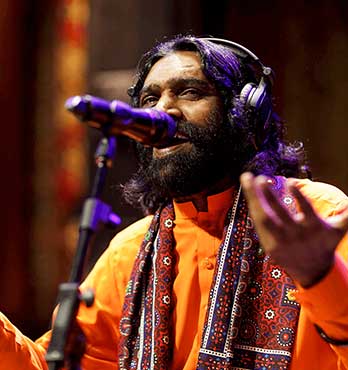Maahi Diyaan Jhokaan

Sometimes, one may meet someone who makes a home in one’s heart. Every waking moment, one finds one has lost control of one’s faculties, one’s heart longs for them, every vessel now possesses something foreign, as if it belongs to someone else -- wishing to rejoin its source. This is love. One finds themselves with a sudden strength, prepared to face the entire world’s scorn for the sake of the recipient of one’s love. This is the love that Maahi Diyaan Jhokaan talks about. At least at first glance.
“This is not a matter of worldly love. We are talking of the love of the Divine. That is the purpose of the Sufi. They disguise messages of Divine love through stories of Ranjha, of Sassi, of worldly love,” explains Barkat Jamal Fakir, the lead vocalist for Maahi Diyaan Jhokaan.
Talab, the Sufis say, is the spiritual yearning that inspires one to seek union with the Divine. It is a gift from the Divine that propels one to seek perfection in all things: in actions, in words, in thoughts. The Divine becomes the Mehboob, the Beloved, and the seeker is consumed by the search for this mehboob. They enter a state of selflessness and complete surrender, turning away from the world, its vices and its luxuries. This is a journey that is not for the faint of heart: it is a complete submission that requires the abandonment, if not demise, of one’s own ego, and a journey inwards, towards the core of one’s Self.
“Latif Sarkar has said, ‘Chho wani mar kaar, hath na goli ho tege,’ why do you look for [the Divine] in others, He dwells within you. Bulleh Shah has said the same. Why do you go to others, what you’re looking for is within you,” says Barkat.
Just as Sufi poetry often uses metaphors to describe this search, Maahi Diyaan Jhokaan is supplemented with a daura about Heer and Ranjha. It recalls Heer’s unyielding love for Ranjha, a love that was sowed at first sight of her beloved. Heer & Ranjha’s story, well known to the Subcontinent, has travelled through the centuries in the words of the Punjabi Sufi poet Waris Shah. Waris tells the tragic tale of Heer, who suffers repeated separation from her beloved Ranjha as society repeatedly denies them their union, eventually poisoning Heer as punishment for her love. A harrowed Ranjha, shattered by his loss and desire to be with his love, willingly follows her to death.
Sufi poets have since used the story as a metaphorical illustration of the yearning for one’s mehboob, the Divine. Just as the path to union is long and strewn with obstacles for Heer and Ranjha, a soul in search of its Source, too, must bear hard burdens before it can hope to achieve Divine Union. Death is also a metaphor, as for a Sufi, one is united with their Beloved when one attains total annihilation, the complete demise of one’s ego.
The Sufi tradition is one that has existed for eons and, while the metaphors are tales of worldly love, the messages hold profound significance for those who seek it. By presenting them in sagas of tragic romances, in the words of inconsolable lovers, in poetry of longing and desire, the Sufi poets before us have, in their wisdom, made their messages more relatable to us. And in one’s pursuit of a spiritual source, one often comes back to find meanings within their words.
Barkat Jamal Fakir sits on the takht on Coke Studio’s set. On his left sits Hussain Bux Fakir, on his right, Sonu Fakir, each strumming an ektara. They launch into an alaap. Their voices have a rawness that brim with a natural tone, their resonance projects of this earth. As the house band launches into its arrangement and the trio begin singing of Heer and Ranjha, and of Divine Love, we are present and ready to sway, the words inviting us to open towards a connection with the Source.
